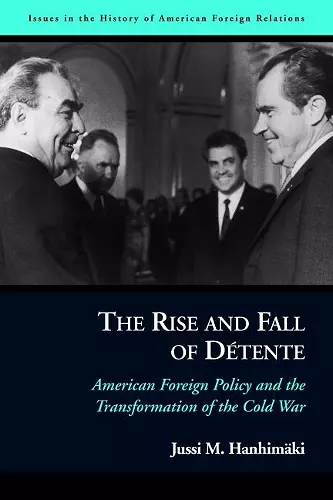The Rise and Fall of Détente
American Foreign Policy and the Transformation of the Cold War
Format:Paperback
Publisher:Potomac Books Inc
Published:1st Nov '12
Currently unavailable, and unfortunately no date known when it will be back

In keeping with the other titles in Robert J. McMahon’s Issues in the History of American Foreign Relations series, Jussi M. Hanhimäki offers students and scholars a survey of the evolution of American foreign policy during a key period in recent history, the era of superpower détente and global transformation in the 1960s and 1970s. Describing détente as not only an era but also a strategy of waging the Cold War, Hanhimäki examines the reasons that led to the rise of détente, explores the highlights of the era’s reduced East-West tensions, and explains the causes of détente’s demise.
He addresses many questions: What were the long-term and short-term causes of détente? Was it a policy “invented” in the United States or adopted under pressure from abroad? Did it represent a radical break with the past—a move from idealism to realism—or was it simply an attempt to prolong the Cold War bipolarity within the international system? Was détente a policy that grew from weakness and doubt (caused particularly by the Vietnam War)? What were its main achievements and shortcomings? What led to its end? In conclusion, he evaluates the role of détente in the dismantling of the Cold War international system.
"Jussi Hanhimäki’s provocative analysis highlights a central paradox: détente triggered a sequence of events that eroded the fundamentals of the very Cold War system it was designed to stabilize. This luminous volume vividly describes the unintended consequences of policy initiatives and provides valuable insight into why the Cold War came to an end."—Melvyn P. Leffler, Edward Stettinius Professor of American History, University of Virginia
"An eminent historian of Cold War history, Jussi Hanhimäki provides an incisive account of the saga of détente. With verve and authority, he examines the deep origins, promising career, demise, and legacy of détente. The dominant strategic ideas, personalities, and events of the era are given their due and nicely woven into a text that combines narrative appeal with analytical bite. The book’s twenty-nine documents, mostly of Soviet and U.S. origin, have been carefully selected to convey to readers both the tone and substance of thinking in Moscow and Washington during a critical moment in the recent past. A thoroughly reliable and significant study!"—David Mayers, professor of history and political science, Boston University
"Détente shaped a hugely important era in Cold War international history, yet it remains poorly understood. Thankfully, we now have Jussi Hanhimäki’s superb account to guide us. Hanhimäki effectively integrates U.S. foreign policy into a more global story that includes but also extends well beyond the famed exploits of Richard Nixon and Henry Kissinger. An invaluable addition to the literature on the Cold War."—Andrew Preston, senior lecturer in history, Cambridge University
"At long last, we have a concise but erudite treatment of one of the Cold War’s pivotal eras. In the hands of Jussi Hanhimäki, détente and its trials, tribulations, and successes are masterfully explored in this highly readable—and reasonable—account of superpower relations at a turning point in modern history. Especially novel and useful is the author’s delving into the decade before Nixon’s presidency to place policies in their proper context amidst the broad sweep of U.S., European, Soviet, and Asian foreign policies. The key questions of why détente began and ended, to what effect, and who benefited and who lost are asked and answered."—Thomas W. Zeiler, professor of history and international affairs and director of the Global Studies Academic Program at the University of Colorado at Boulder
"The Rise and Fall of Détente is a succinct and well-argued account of the attempt of the superpowers to reduce the tensions of the Cold War and give humanity the hope that the nuclear apocalypse could be avoided. Jussi Hanhimäki captures the full complexity of détente, making the case that the policy had the paradoxical effect of undermining the very Cold War system that it was intended to stabilize. Along with the excellent collection of documents, this book is a valuable addition to the study of a fascinating era."—Thomas A. Schwartz, professor of history and political science, Vanderbilt University
"The scholarship on détente has exploded in the last decade, enhancing our understanding of the many dimensions of political, economic, and social change during the 1960s and 1970s. Jussi Hanhimäki is a leading contributor to the new body of scholarship. This book draws on a deep reading of the best research of the last decade, it explains the transformation of the Cold War, and it analyzes why détente did not last. This is a landmark book for understanding the successes and failures of international reform."—Jeremi Suri, Mack Brown Distinguished Chair for Leadership in Global Affairs and author of Liberty’s Surest Guardian: American Nation-Building from the Founders to Obama
ISBN: 9781597970761
Dimensions: unknown
Weight: 445g
296 pages